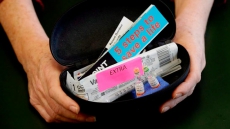TORONTO — A new poll suggests Canadians haven't made much progress in expanding their knowledge of the more colourful parts of the country's history.
The online survey from Historica Canada, the organization behind the country's Heritage Minutes, quizzed respondents on 30 pieces of quirky Canadiana using true or false questions and tallied the number of correct responses.
The organization says 67 per cent of respondents who completed the survey got a failing grade.
That's more than the 62 per cent of respondents who failed a similar survey last year, in which Historica quizzed them on trivia tidbits such as the fact that the Montreal Canadiens once lost the Stanley Cup by the side of the road while changing a tire.
This year, Historica says scores were particularly poor for questions related to science and innovation, with most test-takers failing to recognize that both the world's first internet archive and the popular Jolly Jumper baby exercise toy were Canadian inventions.
Poll respondents were also fooled by false statements, largely believing claims that the Newfoundland dog became an official national symbol after a former prime minister received one as a gift when the province officially became part of Canada.
Historica Chief Executive Officer Anthony Wilson-Smith readily admits this year's batch of questions were "nasty," noting the poll results should not be taken for a sign of overall ignorance about Canadian history.
But Wilson-Smith said the questions, if not the results, should serve to challenge what he views as a common myth about the study of Canada's past.
"It drives me crazy, this idea that Canadian history is boring," he said in a telephone interview. "No, it's not. People just haven't bothered to look closely enough at the real human stories and quirky things that have happened here."
The survey of 1,002 participants, administered by Ipsos, broke questions down into five categories to quiz respondents on their knowledge of science and innovation, geography, culture, sports and animals.
Survey participants demonstrated strongest knowledge of geographical questions, with 48 per cent scoring a passing grade in that category.
Passing likely involved correctly recognizing that more people live in Canada's smallest province of Prince Edward Island than the largest territory of Nunavut, and that the city known today as Kitchener, Ont., was once named Berlin and opted to change its name during the First World War.
Questions related to literature also drew a relatively high number of correct responses.
The survey found 47 per cent of respondents knew that "Anne of Green Gables" has been part of Japan's public school curriculum since 1952.
Even more, 68 per cent, were aware that Winnie the Pooh was inspired by a real bear named for the city of Winnipeg that travelled overseas with a Canadian soldier during the First World War.
On the flip side, the vast majority of Canadians were under the mistaken impression that the country's men's soccer team has never qualified for the FIFA World Cup, with only 23 per cent of respondents recognizing that claim as false.
Only 19 per cent of those completing the survey knew that the first recorded instance of dressing in costume on Halloween in North America was documented in Vancouver in 1898.
Overall performance was weakest in the science and innovation category. Only 30 per cent of respondents, for instance, knew that the first internet search engine was developed by a graduate student at Montreal's McGill University. The engine was dubbed "Archie," or "archive" without the v.
Historica found regional discrepancies in participant's quiz scores, with 37 per cent of respondents in Saskatchewan or Manitoba recording passing grades. That rate fell to 22 per cent for poll participants in British Columbia.
Pass rates did not vary by age, the survey found, but were eight per cent higher among men than women.
The online survey was conducted between June 11 and 14. The polling industry's professional body, the Marketing Research and Intelligence Association, says online surveys cannot be assigned a margin of error as they are not a random sample and therefore are not necessarily representative of the whole population.



